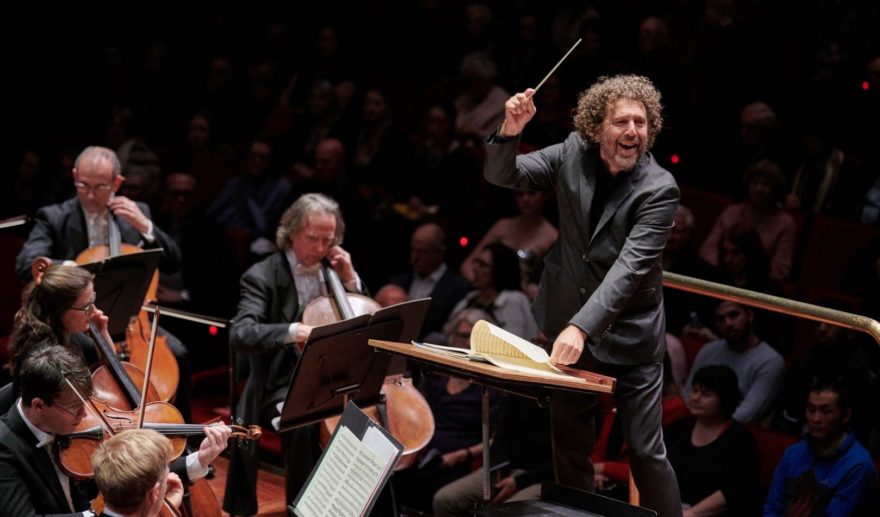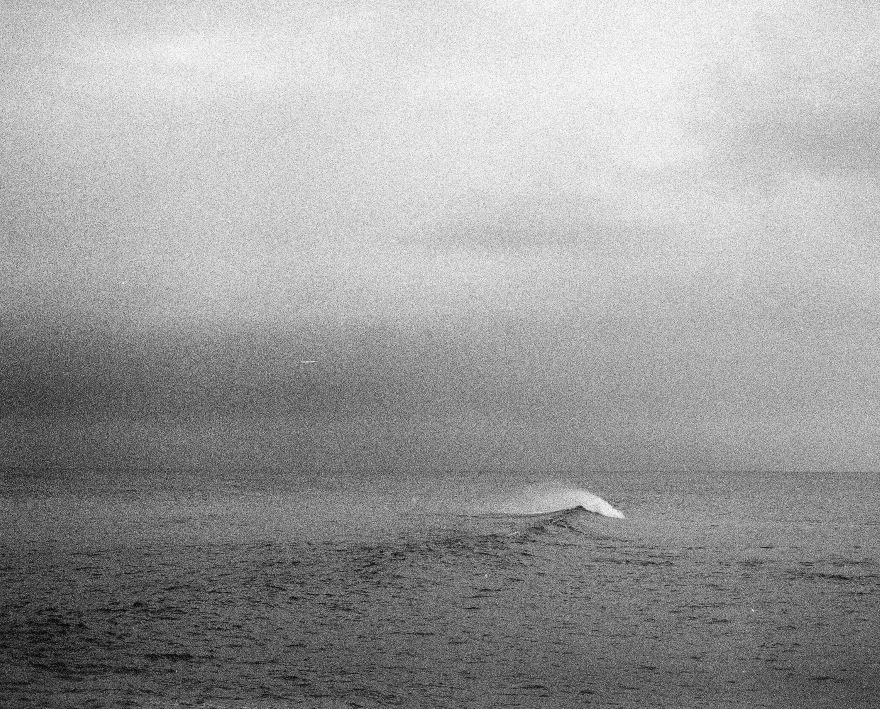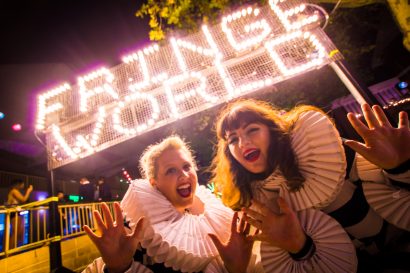Olivia Bettina Davies is the first woman composer in residence with the West Australian Symphony Orchestra. Her new work ‘In Waves’ will be premiered on 5 March and she chats with Rosalind Appleby about the unexpected pleasure in “making stuff up”.
An orchestra of her own
15 October 2021
- Reading time • 10 minutesMusic
More like this
- Rewriting tradition with skill and charm
- Close encounter stirs the soul
- The great unknown
“I was a terrible music student,” confesses Olivia Bettina Davies over coffee at The Telegram. “Not exactly terrible; I was good, but when I was practicing I’d always end up just making stuff up. I think it’s a good thing to explore your own ideas and to improvise. It’s so indulgent, sitting there and getting lost in your own world.”
Davies has recently accepted the position of composer in residence with the West Australian Symphony Orchestra. The three-year residency, which will kick off with the premiere of a new work as part of the Perth Festival in March 2022, marks the first time that the orchestra has engaged a woman as composer in residence.
Davies’ forays into composing began at an early age at the piano, but due to an absence of female role models, she didn’t consider composition as a career until after completing a degree in photography at Edith Cowan University. At a loose end, she began studying composition at the University of Western Australia with James Ledger and Christopher Tompkin and despite having “zero expectations” about a career in writing music, she found immediate success, winning the UWA Dorothy Ellen Ransom Prize in Musical Composition. Her work has been recorded by the Australian Chamber Orchestra Collective for the Hush Foundation album Collective Wisdom and in 2015 she was a participant in WASO’s Composition Project, with her work Stratus premiered by the orchestra earlier this year to great acclaim.
With this new appointment, the 33 year old has been given the rare opportunity to have an orchestra of her own to work with.
“The opportunities that I’ve had, everything feels like a bonus, because I never expected it,” Davies explains. “The residency with WASO is really exciting. What I hope is to develop my own voice, and the opportunity to do that with an orchestra is huge, mind boggling.”
The obvious choice
Joining us for coffee is Evan Kennea, WASO’s Executive Manager of Artistic Planning, who says it was clear, after watching Davies work with the orchestra on Stratus, that she was the obvious choice for the position.
“Stratus is a great piece, the orchestra really responded, and the audience were really, really engaged. There’s something special in Olivia’s voice. It was immediately apparent that there’s something there which will keep developing and growing. And there’s a kind of seriousness about the craft of writing music. That’s what you want, someone who is going to take who they are and then through that residency, keep pushing their own boundaries.”
Principal conductor Asher Fisch first met Davies while working on the premiere of Stratus in March, and shared his thoughts during our recent podcast conversation:
“Olivia Davies is different. She has very early on developed her own language, and that for me is the most important thing. I see a composer who is an individual who can speak in their own language and disregard traditions and trends.”

Fisch says a residency is important for composers, who have to fight to survive in an industry that battles a disconnection with contemporary culture.
“I have to apologise for programming Berg’s Three Pieces for Orchestra composed 100 years ago because it is uber modern. A lot of composers try to work over this disconnect and to connect to the audience and it is important they do that otherwise each world premiere becomes a world dernière – the first performance is also the last performance, and we want to avoid that! But Olivia goes her own way and is not trying to be popular and I think that is the way to go. Because in the end – even now – her piece was warmly accepted by the audience.”
Why visibility matters
Despite Davies’ early successes as a composer, the gender disparity that exists in the world of music composition had a significant impact on her. The 33 year old believes the increased visibility resulting from her position will be important for younger women considering careers in music.
“It’s so insidious, you can’t really describe it. For a long time I never really thought of composition as an option for me. I didn’t have role models, I didn’t have female composers that I looked up to, or I didn’t know of any. I think visibility’s huge for that reason, it’s as simple as just having someone there to show to another young girl that you can be a composer, of course you can. It’s those really subtle things that were a part of my doubt or uncertainty about composing being an option.”
Read more about WASO’s bold new plans for 2022.
Kennea says the residency is a unique opportunity for the orchestra and audience to journey with Davies over the next three years.
“We’re on a journey with this composer and we’re eager to see what the next sort of step is. We want people, when they open a brochure and see “Olivia Davies new work”, to have this sense of anticipation, a sense of ‘We’ve heard her before, what’s next, where is she at, is she going to take that same idea or is there a new thing she’s trying out?’ That’s really exciting because you don’t always get the ability to have a longer term engagement with a composer.”
Making creative space
The residency will coincide with significant renovations to the Perth Concert Hall, which will require the orchestra to seek other performance venues. Kennea says Davies will be key to exploring the creative opportunities that might arise from this.
“We’ve got a couple of big pieces which we’re looking at. But we also want to leave space to see how Olivia evolves and the orchestra evolves, not just be prescriptive. It’s got to be something that works for the orchestra, but also responds to what Olivia wants to get out of the residency.”
Davies writes acoustic and electro-acoustic music that spans multiple genres including classical minimalism, experimental and ambient. She cites Hungarian-Austrian György Ligeti as an influence and her compositions are often texturally-driven, exploring ideas of space, stasis and flow.
She continues to practice photography and draws on visual imagery as part of her compositional process.

“I like to look at the instruments that I’m writing for and think ‘What’s the character of that instrument? What’s the colour? How can I explore that over the course of a piece?’
And then think about a mood or an atmosphere, or the form or shape of the piece. I write down ideas, I listen to a lot of things, I look a lot into the visual art world and photography as well… until I have a clearly honed concept. When I start notating I always keep checking back with my main idea. And that’s why it’s good to have a strong concept to begin with. It’s easy to get tempted to change things or get distracted by other ideas.”
Her goal is for the audience to have space to listen and be immersed in the music.
“I like pieces where you’re not being dictated to in terms of how you should hear something. That’s why I write kind of atmospheric, textural, ambient sorts of works where there’s space for the listener to search the sound and the textures and take time to do that. To be immersed in it let it wash over them.”
Davies next new work will be premiered at “Become Ocean: WASO & WAYO Side-by-Side” in March 2022. Also on the program is Britten’s Peter Grimes: Four Sea Interludes and the Australian premiere of John Luther Adams’ Become Ocean.
“Become Ocean: WASO & WAYO Side-by-Side” is on 5 March 2022.
Like what you're reading? Support Seesaw.






